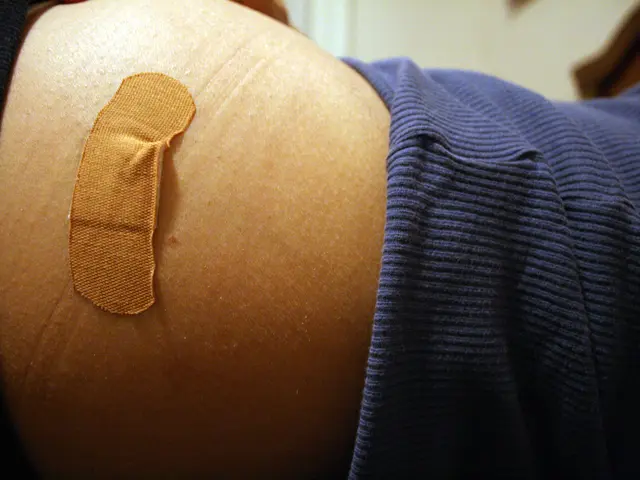Eating Poorly Might Lead to Early Periods and Boost Risk for Breast Cancer Later in Life
Early research identifies factor behind premature onset of puberty in girls as young as nine, potentially heightening their susceptibility to cancer.
New research hints that chowing down on junk food could lead to girls starting their periods earlier, potentially increasing their risk of breast cancer down the line.
This fascinating study discovered that girls who consumed plenty of vegetables, whole grains, and lean protein were more likely to hit puberty at an older age compared to those who noshed on processed food and salty snacks.
It was important to note that this association wasn't influenced by body mass index (BMF), demonstrating the influence of a healthy diet regardless of weight status.
Previous research has demonstrated that starting puberty at an abnormally young age can bump up a woman's risk of breast cancer later in life. This is thought to be due to extended exposure to reproductive hormones like estrogen, which promotes breast tissue growth, elevating the likelihood of breast cancer.
In fact, a 2012 analysis that pooled data from over 100 studies showed that for every year younger a girl began her period, her breast cancer risk amplified by 5%. If a girl started her period around 10 years old, her risk of breast cancer later in life increased by 25% compared to a girl who started at 15.
As it turns out, puberty is starting in girls earlier now compared to decades past, and experts believe this could be due to lousy diets setting the stage for complications such as breast cancer, diabetes, and heart disease in adulthood.
This is the first study of its kind to probe the link between diet and the age that girls start their period. The researchers investigated through the lens of two established eating patterns: the alternative healthy eating index (AHEI) and the empirical dietary inflammatory pattern (EDIP). A healthy index diet awards more points for healthier foods like vegetables, legumes, and whole grains, whereas unhealthy options like red and processed meats and salt earn lower scores. Experts hypothesize that eating a diet packed with fruits, vegetables, legumes, and whole grains could be associated with periods starting later in life. On the flip side, foods that are likely to aggravate inflammation in the body, such as processed meats, sugary drinks, and refined carbohydrates like pasta and white bread, might set the stage for an earlier onset of puberty.
After following 7,530 girls, aged 9 to 14, for two waves, from 1996 to 2001, and 2004 to 2008 respectively, the researchers found that 93% of girls had their first period at around 13 years old. They found that the girls with the healthiest diets were 8% less likely to start their period within the first month of the study when compared to those with unhealthy eating habits. On the flip side, those with the most processed meat and refined carbs in their diets were 15% more likely to start their period in this time frame. These girls also reported less exercise in comparison to the girls with the healthiest diets.
The researchers concluded that a healthier diet might lead to menstruation starting at an older age, which could be beneficial for long-term health. The study was published in the journal Human Reproduction.
In recent years, it has been found that girls are going through puberty earlier than they used to, which can set them up for complications such as breast cancer, diabetes, and heart disease in adulthood. Girls who start their period before age 11 have a 15-20% increased risk of breast cancer. The average age that puberty starts has been decreasing in girls, according to studies. A study published last year found that girls born between 2000 and 2005 started their period at around 11 years old, compared to 12 years old during the 60s and 70s. This trend is particularly concerning as it puts girls at a higher risk for diabetes, obesity, breast cancer, and heart disease. Breast cancer is the most common cancer in the UK.
Some experts believe that girls are starting puberty earlier because of the ongoing obesity crisis. Fat cells contain hormonal properties that can trigger puberty at a younger age. One of the most devastating consequences of starting puberty early is the increased risk of developing breast or uterine cancer later in life. Even though this connection had been speculated on in previous years, groundbreaking research in 2020 finally established the association between early puberty and breast cancer. Dr Dale Sanders, chief epidemiologist at the National Institute of Environmental Health, explained, "Girls experience hormonal changes during puberty, along with changes to the breast tissue itself, that we think can affect breast cancer risk." Dr Frank Biro, who led the 2020 research, agreed that early puberty can increase breast cancer risk.
- New research contends that a diet rich in junk food could potentially trigger early menstruation, increasing the risk of breast cancer later in life.
- The study found that young girls who consumed more vegetables, whole grains, and lean proteins were likely to hit puberty at a later age compared to those who ate processed food and salty snacks.
- Previous research demonstrated that beginning puberty at an abnormal young age can augment a woman's risk of developing breast cancer later in life.
- A 2012 analysis concluded that for every year a girl started her period earlier, her breast cancer risk heightened by 5%.
- Puberty is commencing in girls at earlier ages now compared to past decades, and it's postulated that poor diets could be a catalyst for complications such as breast cancer, diabetes, and heart disease in adulthood.
- This is the first study to assess the link between diet and the age that girls start their period, investigating two established eating patterns: the Alternative Healthy Eating Index (AHEI) and the Empirical Dietary Inflammatory Pattern (EDIP).
- The study concluded that a healthier diet might lead to menstruation starting at an older age, which could be advantageous for long-term health, especially in preventing breast cancer.









